Where it all began: A remote town in Western Australia
As a young boy, Moodle’s Founder and CEO, Martin Dougiamas, lived nearly 1000 kilometres from the nearest school in a remote area of the Western Australian desert. This was in the 1970s, long before computers were a household item or readily accessible to students. To pursue his education, Martin’s family registered him into the School of Air – learning delivered through shortwave radio, the best available technology at the time. This experience with distance learning sowed the seeds of Martin’s vision to use the Internet to:
- Take education beyond physical classrooms that have barely changed in hundreds of years
- Enable quality education in all corners of the globe
Coupled with this vision is Martin’s support of the United Nations Universal Declaration of Human Rights that everyone has the right to education. To break the barriers faced by millions in accessing education, Martin founded Moodle with the goal of creating an online learning solution that is flexible to learner’s needs, accessible, and would provide a quality education for all.
 Martin Dougiamas
Martin DougiamasFounder & CEO, Moodle
"One of the seventeen UN Sustainable Development Goals is to ensure inclusive and equitable quality education and promote lifelong learning opportunities for all. In fact that’s the most important one, because without that, we can’t achieve any of the other sixteen goals!"
History
1996 – 2000
1999
Martin realises he needs to learn more about communications theory and education, and commences a Masters in Science Education, and then later a PhD with Professor Peter Taylor. The paper Improving the Effectiveness of Online Learning describes study around some early prototypes.
Martin starts calling his new system Moodle, a word he invents based on the acronym Martin’s Object-Oriented Dynamic Learning Environment (later changed to Modular Object-Oriented Dynamic Learning Environment, when other people started to use it).

2001 – 2005
2001
Action is in full swing now, and within months, Moodle is being used all over the world.
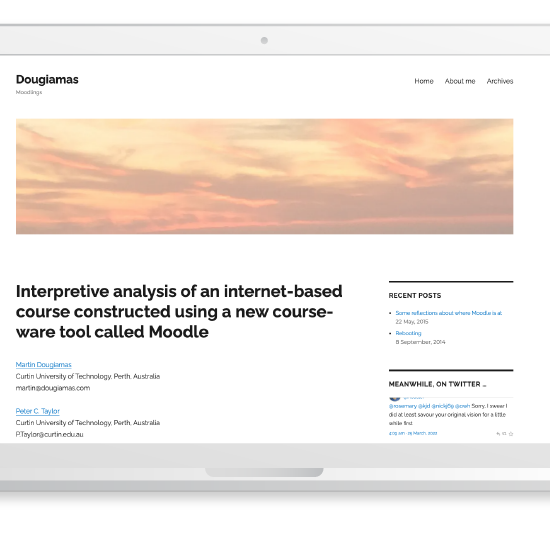
2002
Martin sets up the Moodle tracker in May 2002, “so you can see what I am working on.”
After Moodle 1.0 is released, users start discussing Moodle on a new forum, translating Moodle into different languages and creating themes.
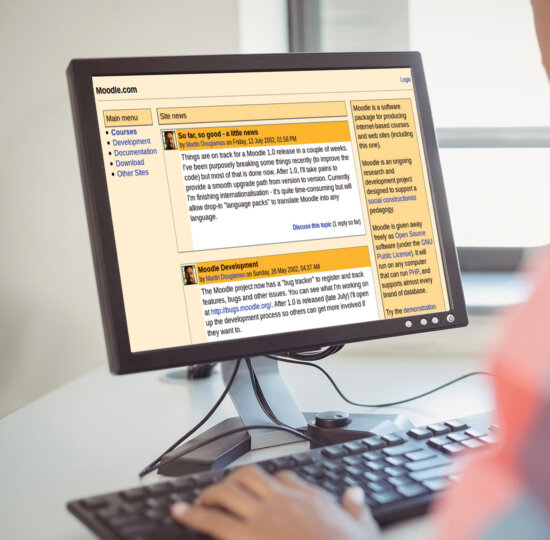
2003
The community installation of Moodle including all the community forums is migrated to Moodle.org, with Moodle.com becoming the commercial aspect.
Martin presents Moodle at Edmedia 2003 conference with the paper: Moodle: Using Learning Communities to Create an Open Source Course Management System. The conference is attended by innovators in the burgeoning EdTech field from all over the world. Martin’s presentation of the paper (and demo of Moodle) is full to capacity, and the organisers ask him to present it again the next day – to another full room.
Moodle LMS 1.1

2004
The first ever Moodle conference for Moodle users to share experiences and to learn from each other is hosted in Oxford – £15 for admission and cake! The organiser, Sean Keogh, names it a MoodleMoot (A moot is an old english word meaning a “meeting of the wise”), and to this day, all official Moodle conferences are still called MoodleMoots!
Martin registers the word ‘Moodle’ as a trademark of Moodle Pty Ltd and explains his choice of name in a forum post some years later.
Companies commence applying to become Moodle partners and the first partnerships are being finalised.
Moodle LMS 1.2
Moodle LMS 1.3
Moodle LMS 1.4
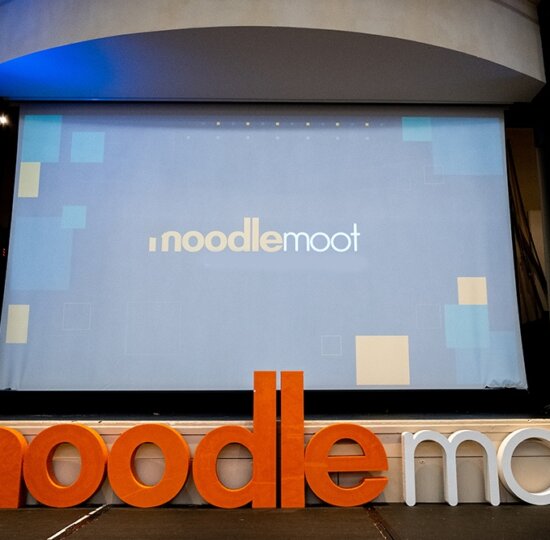
2005
At the Spanish MoodleMoot 2005 in Las Palmas de Gran Canaria, the mojito establishes itself as the unofficial – and then subsequently official – MoodleMoot drink.
Moodle LMS 1.5
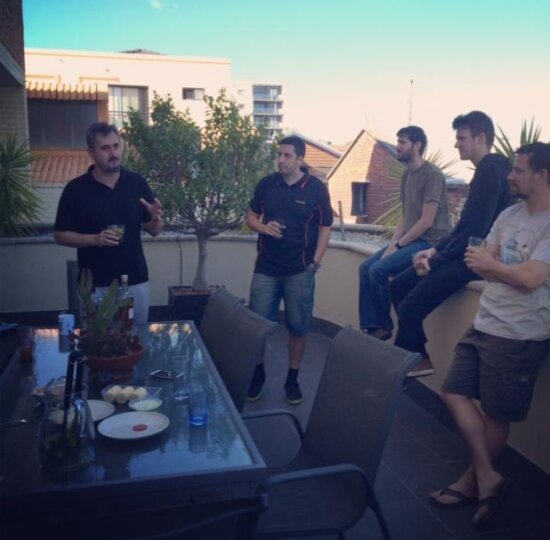
2006 – 2010
2006
Moodle LMS 1.7
2007
Moodle joins forces with eff.org (a leading non profit defending digital privacy, free speech and innovation) to overturn a patent granted to a leading propriety software company allowing them to own education software designed to facilitate collaborative working by a number of users.
Moodle LMS 1.8

2008
Moodle continues growing from strength to strength, and by 2008 has established itself as the dominant LMS, winning multiple awards and registering over half a million users.
In 2008, Martin accepts the Google O’Reilly Open Source Award.
Moodle LMS 1.9

2009
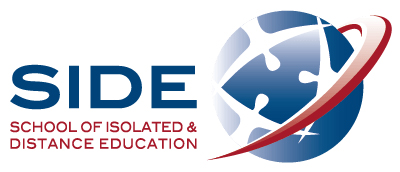
2010
Just two years after hitting half a million registered users, Moodle reaches a new milestone with 1 million users.
Moodle now has 50 certified Moodle partners.
The Translation repository AMOS holds over 100 languages.
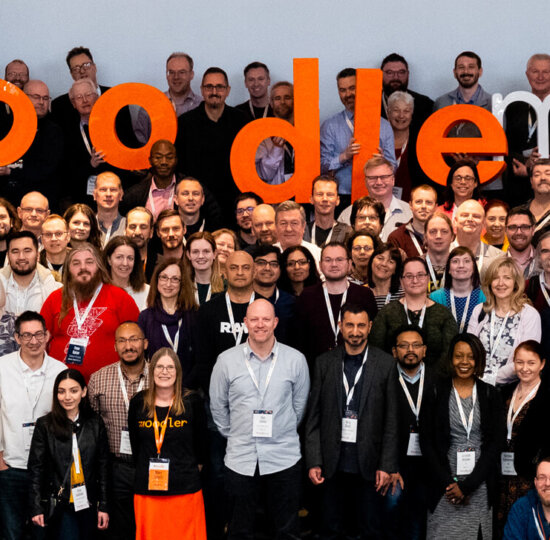
2011 – 2015
2011
Moodle LMS 2.2
2012
The first Moodle Research Conference held in Crete in 2012 attracts over 100 researchers, and serves as a reminder that, however advanced the technology, Moodle design and development is guided by social constructionist pedagogy.
Moodle is mandated as the online learning management system across all classes at the Western Australian School of Isolated & Distance Education, that same “School of the Air” that Martin, Moodle’s CEO and Founder, attended in the 1970s.
Moodle LMS 2.3
Moodle LMS 2.4

2013
In September, the first official Moodle MOOC, Learn Moodle, introduces over 9000 participants to Moodle’s basic features, demonstrating Moodle’s abilities as a MOOC platform. The MOOC’s success makes it a permanent fixture of the community, and continues to run for each new release of Moodle LMS.
Moodle LMS 2.5
Moodle LMS 2.6

2014
Moodle LMS 2.8
2015
Moodle App 2.0 launches, supporting the majority of Moodle’s core activities and new plugins.
18 million registered users
Moodle achieves its greatest milestone yet: it becomes the world’s most used learning management system.
In July, alongside a major redesign of moodle.com, a new initiative is announced: MoodleCloud offering free hosting for Moodle sites, managed by Moodle HQ.
Moodle LMS 2.9
Moodle App 2.1 – 2.7
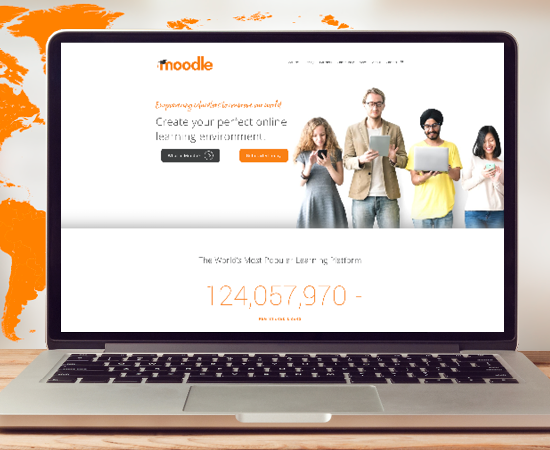
2016 – 2020
2016
Branded Moodle App launches. Organisations can now have their own, customised app to provide streamlined learning on mobile devices.
100 million registered users
Moodle 3.0 brings so much success to Moodle, that it reaches a new record of registered users.
The mobile app updates now include almost all the standard features available on desktop and we see the release of the Branded App. This is a commercial service where organisations can have their branding applied to the standard app.
Throughout 2016, HQ works on improving Moodle’s User Experience (UX) by forming the first UX team and also releasing a fresh new default theme – the Boost theme.
Moodle LMS 3.1
Moodle LMS 3.2
Moodle App 3.1 – 3.2
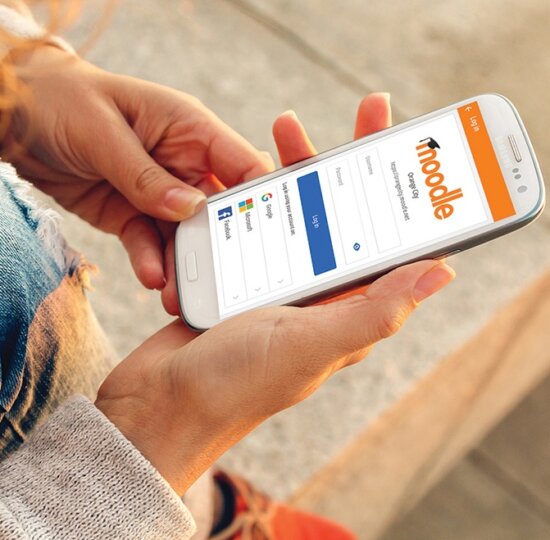
2017
New projects are developed, including:
- Spreading MoodleMoot events into many more countries around the world
- Establishing the first Education team
- Re-affirming Moodle’s mission of empowering educators to improve our world
Moodle LMS 3.3
Moodle LMS 3.4
Moodle App 3.3 – 3.4
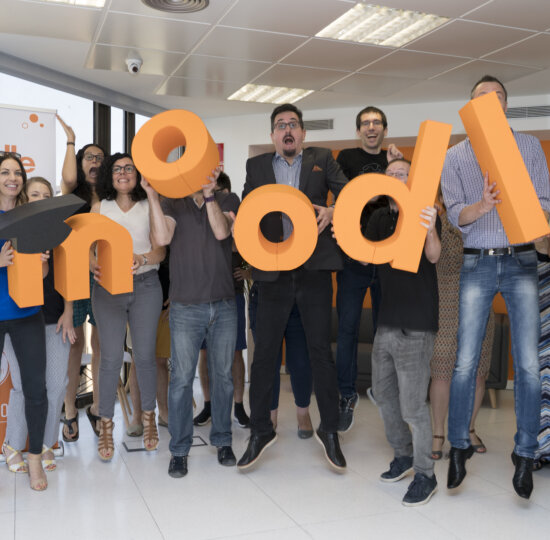
2018
Moodle LMS 3.6
Moodle App 3.5
2019
The first Global MoodleMoot takes place in Barcelona in November 2019.
The Moodle Plugin Directory reaches 1,600, with over 380,400 downloads.
The Moodle App becomes available in Google Play and the App Store (iOS).
Moodle announces the launch of Moodle Workplace at the Learning Technologies conference in February: a flexible, multi-tenant and customisable platform that transforms human capital management and enhances the functionalities of Moodle LMS for workplace learning.
Moodle LMS 3.7
Moodle LMS 3.8
Moodle App 3.7 – 3.9
Moodle Workplace 3.7 – 3.8
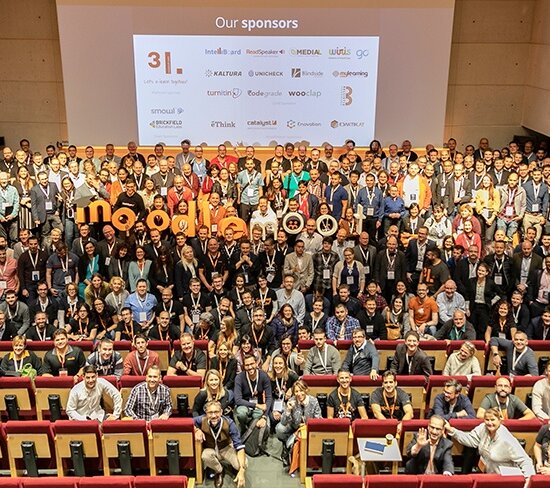
2020
The latest versions of Moodle LMS enable educators to create and upload H5P content, store it, personalise it, use it across multiple courses, and have grades displayed in the gradebook. Course content can be downloaded and browsed offline and enables paid enrolments. Moodle Quiz, one of the most popular and loved activities on Moodle, is further improved with new UX features.
Moodle LMS 3.10 achieves WCAG 2.1 AA accreditation after an accessibility audit.
Launch of Bugcrowd security program.
In May, the Moodle Educator Certification program is launched to certify experienced Moodle-using teachers, and progress is made on a new resource-sharing site MoodleNet.
The global COVID-19 pandemic creates an exponential increase in demand for online or e-learning management solutions to allow educators to keep teaching K-12 school, vocational and higher educational students. Moodle responds with a MoodleCloud plan for up to 1000 users.
Due to COVID-19, all MoodleMoots move to virtual conferences. In particular, Moodle runs the Global MoodleMoot in 5 languages with over 1400 paying attendees.
Moodle’s network of Certified Service Providers are located in 52 countries and speaking over 35 different languages. In February, the Moodle Certified Premium Partner program is launched.
Moodle LMS 3.9
Moodle LMS 3.10
Moodle App 3.9
Moodle Workplace 3.9 – 3.10

2021 – Now
2021
MoodleNet, the network to share and curate open educational resources will be revamped and launched.
Moodle US launches! Moodle acquires three US-based Moodle Partner companies: My Learning Consultants, Moonami Learning Solutions and Elearning Experts to form Moodle US representing the first time customers can access services direct from Moodle itself. Moodle US unites an outstanding team of Moodle experts and hosting technology for customers in the US.
Moodle becomes a Certified B Corporation. After an organisation-wide review of Moodle’s social and environmental performance, accountability, and transparency, this certification recognises Moodle’s commitment to using business as a force for good.
Moodle LMS 3.11
Moodle Workplace 3.11
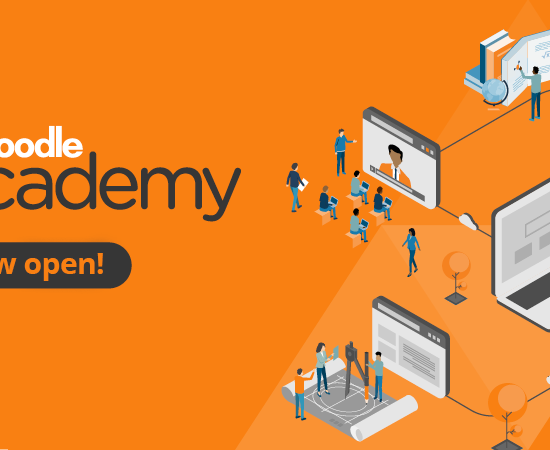
2022
Moodle LMS 4.0 is released in April 2022 to improve the user experience for Moodle’s 300 million users worldwide.
MoodleNet, an open-source social network designed to sustainably empower communities of educators, teachers and trainers to share and curate educational resources, is introduced.
Moodle LMS has achieved the status of a Digital Public Good in alignment with the Digital Public Goods Standard and has been added to the DPG Registry. The registry promotes digital public goods to create a more equitable world.
Moodle Academy, the learning hub for the global Moodle community, has turned one!
Martin Dougiamas, founder and CEO of Moodle, received an Honorary Doctorate from the Department of Digital Systems of the School of Information Technology and Communications of the University of Piraeus, Greece.
Moodle Workplace 4.0 has been launched! This version gives Moodle Workplace unique advantages as a platform to develop, upskill, and reskill employees.
MoodleMoot Global returned to Barcelona in September 2022 and saw 835 people from 60 countries unite for 124 presentations in 3 days.
The Moodle Plugins directory surpassed 2,000 open-source plugins!
Moodle India launch! Moodle acquired eAbyas Info Solutions, providing entry into one of the world’s largest and fastest-growing eLearning markets.
Moodle LMS 4.1
Moodle Workplace 4.0.5
Moodle App 4.1.0
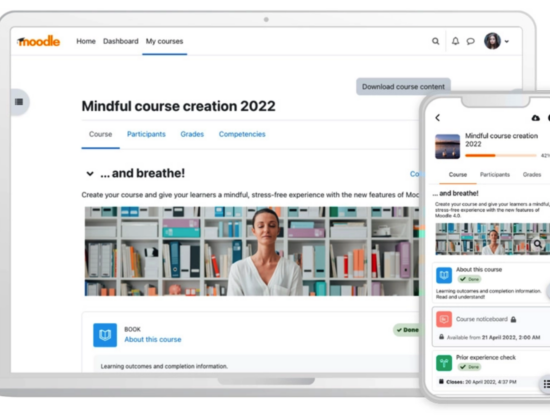
2023
Following Moodle’s commitment to open and inclusive education, Moodle US creates a course in collaboration with UNESCO to help literacy educators improve their digital competencies.
Moodle LMS 4.1.2
Moodle Workplace 4.1.2
Moodle App 4.1.1
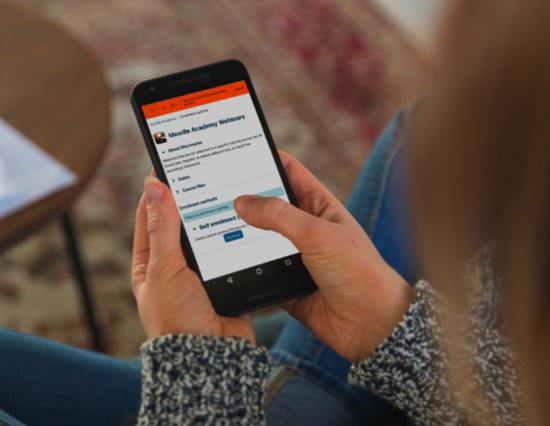
Subscribe to our monthly newsletter
